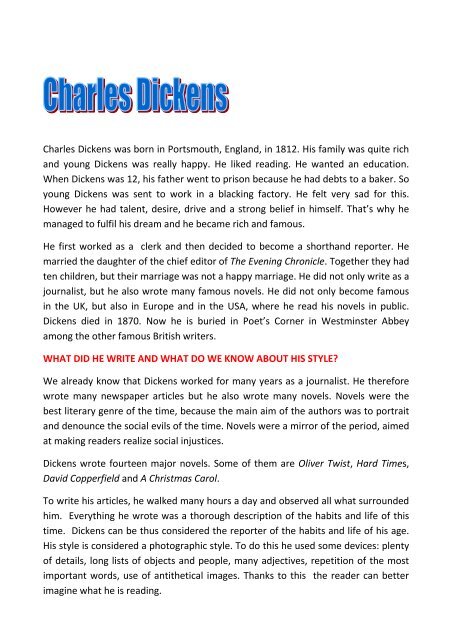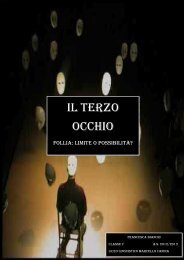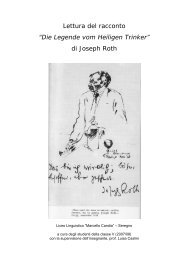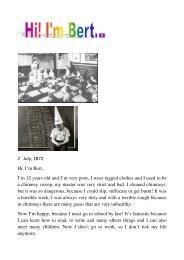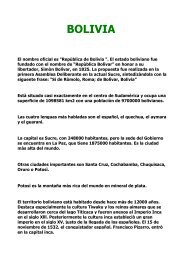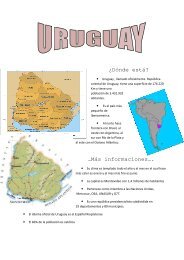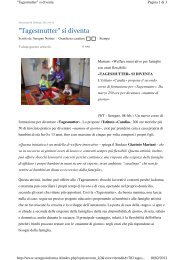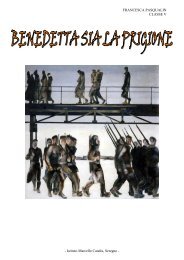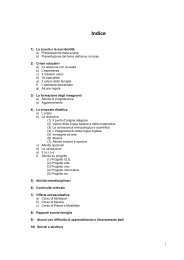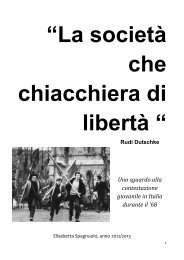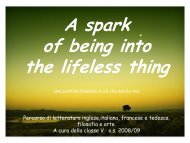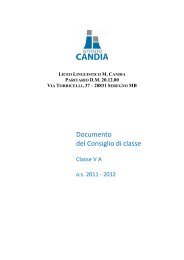Charles Dickens was born in Portsmouth, England, in 1812. His ...
Charles Dickens was born in Portsmouth, England, in 1812. His ...
Charles Dickens was born in Portsmouth, England, in 1812. His ...
You also want an ePaper? Increase the reach of your titles
YUMPU automatically turns print PDFs into web optimized ePapers that Google loves.
<strong>Charles</strong> <strong>Dickens</strong> <strong>was</strong> <strong>born</strong> <strong>in</strong> <strong>Portsmouth</strong>, <strong>England</strong>, <strong>in</strong> <strong>1812.</strong> <strong>His</strong> family <strong>was</strong> quite rich<br />
and young <strong>Dickens</strong> <strong>was</strong> really happy. He liked read<strong>in</strong>g. He wanted an education.<br />
When <strong>Dickens</strong> <strong>was</strong> 12, his father went to prison because he had debts to a baker. So<br />
young <strong>Dickens</strong> <strong>was</strong> sent to work <strong>in</strong> a black<strong>in</strong>g factory. He felt very sad for this.<br />
However he had talent, desire, drive and a strong belief <strong>in</strong> himself. That’s why he<br />
managed to fulfil his dream and he became rich and famous.<br />
He first worked as a clerk and then decided to become a shorthand reporter. He<br />
married the daughter of the chief editor of The Even<strong>in</strong>g Chronicle. Together they had<br />
ten children, but their marriage <strong>was</strong> not a happy marriage. He did not only write as a<br />
journalist, but he also wrote many famous novels. He did not only become famous<br />
<strong>in</strong> the UK, but also <strong>in</strong> Europe and <strong>in</strong> the USA, where he read his novels <strong>in</strong> public.<br />
<strong>Dickens</strong> died <strong>in</strong> 1870. Now he is buried <strong>in</strong> Poet’s Corner <strong>in</strong> Westm<strong>in</strong>ster Abbey<br />
among the other famous British writers.<br />
WHAT DID HE WRITE AND WHAT DO WE KNOW ABOUT HIS STYLE?<br />
We already know that <strong>Dickens</strong> worked for many years as a journalist. He therefore<br />
wrote many newspaper articles but he also wrote many novels. Novels were the<br />
best literary genre of the time, because the ma<strong>in</strong> aim of the authors <strong>was</strong> to portrait<br />
and denounce the social evils of the time. Novels were a mirror of the period, aimed<br />
at mak<strong>in</strong>g readers realize social <strong>in</strong>justices.<br />
<strong>Dickens</strong> wrote fourteen major novels. Some of them are Oliver Twist, Hard Times,<br />
David Copperfield and A Christmas Carol.<br />
To write his articles, he walked many hours a day and observed all what surrounded<br />
him. Everyth<strong>in</strong>g he wrote <strong>was</strong> a thorough description of the habits and life of this<br />
time. <strong>Dickens</strong> can be thus considered the reporter of the habits and life of his age.<br />
<strong>His</strong> style is considered a photographic style. To do this he used some devices: plenty<br />
of details, long lists of objects and people, many adjectives, repetition of the most<br />
important words, use of antithetical images. Thanks to this the reader can better<br />
imag<strong>in</strong>e what he is read<strong>in</strong>g.
Therefore, the people so well portrayed <strong>in</strong> his novels are people he had really met.<br />
The events we are told about are real events. The problems described are real<br />
problems. As a matter of facts he <strong>was</strong> a campaign<strong>in</strong>g artist and he wanted to attack<br />
all the evils that surrounded him. He wrote about poverty, social problems, young<br />
and old people, rich or poor, happy and miserable. He wanted to denounce the<br />
faults of the legal system, the horrors <strong>in</strong> the factories, the exploitation of children<br />
and women, etc.<br />
WHAT WERE INSTALLMENTS?<br />
<strong>Dickens</strong> wrote many novels and he published them <strong>in</strong> <strong>in</strong>stallments.<br />
Installments were parts of novels, published <strong>in</strong> magaz<strong>in</strong>es every week or month at a<br />
very low price. This cont<strong>in</strong>ued for many months until the story <strong>was</strong> f<strong>in</strong>ished.<br />
This <strong>in</strong>creased the number of readers, even among the lower classes.<br />
Publish<strong>in</strong>g a novel <strong>in</strong> <strong>in</strong>stallments <strong>was</strong> quite common <strong>in</strong> the Victorian age. Writers<br />
had to f<strong>in</strong>d devices and stratagems to catch and hold the reader attention. One of<br />
these stratagems <strong>was</strong> the creation of suspense and expectation at the end of each<br />
<strong>in</strong>stallment.<br />
Another stratagem <strong>was</strong> the use of images <strong>in</strong> the books, to catch the attention of the<br />
readers and also to help the readers better understand the novel. Each part <strong>was</strong><br />
therefore issued with two illustrations. <strong>Dickens</strong> worked <strong>in</strong> close collaboration with<br />
many illustrators. <strong>Dickens</strong> selected some scenes <strong>in</strong> particular to be illustrated, to<br />
provide the reader with what he considered key scenes need<strong>in</strong>g emphasis.<br />
All what <strong>Dickens</strong> wrote <strong>was</strong> a thorough description of his time, a very difficult period<br />
<strong>in</strong> the life of British people.<br />
Dur<strong>in</strong>g the Victorian Age society <strong>was</strong> divided <strong>in</strong>to three social classes: the upper<br />
class, the middle class and the work<strong>in</strong>g class.<br />
It <strong>was</strong> the period of the Industrial Revolution, characterized by many fantastic and<br />
useful <strong>in</strong>ventions. Unfortunately not everybody could benefit from such a prolific
period. As a matter of facts life became really hard for the work<strong>in</strong>g class, that is to<br />
say the majority of people. In this class there were really poor people who were<br />
exploited by the rich class. They lived <strong>in</strong> unhealthy squalid overcrowded slums,<br />
because they didn't have a good job and couldn’t afford for example a house or<br />
enough food. They had a little pay for a very hard job.<br />
Everybody had to work, not only adults but also children. Children <strong>in</strong> particular were<br />
exploited. They were obliged to do the worst jobs: they could be m<strong>in</strong>ers,<br />
blacksmiths, chimney sweepers, toshers ...<br />
But what if you lost your job or didn’t have enough money? In this century if you<br />
were poverty-stricken or an unwanted orphan you could end up <strong>in</strong> the dreaded<br />
union workhouse. There were two ma<strong>in</strong> aims that lead to the workhouse: it <strong>was</strong> a<br />
shelter for the people that lost everyth<strong>in</strong>g, but it <strong>was</strong> also a deterrent for the lazy<br />
people. The liv<strong>in</strong>g conditions <strong>in</strong> the workhouses were terrible. The build<strong>in</strong>g <strong>was</strong> like<br />
a prison because it <strong>was</strong> grim and <strong>in</strong>timidat<strong>in</strong>g. In the workhouses there were<br />
separate areas for women, men and children. Sometimes children <strong>born</strong> <strong>in</strong> a<br />
workhouse died without hav<strong>in</strong>g seen any other places. In the workhouse they were<br />
given a prison-style uniform, so that everybody knew where you ‘lived’. You had to<br />
get up at 5.00 a.m. and you had to go to bed at 8.00 p.m. Dur<strong>in</strong>g the day you had to<br />
work hard. You were given very little food. If you tried to escape or if you didn’t<br />
obey rules you were convicted as an idle or disorderly person, or even sentenced to<br />
imprisonment with hard work.<br />
THE WORKHOUSE<br />
A long time ago every town <strong>in</strong> <strong>England</strong> had a workhouse. Workhouses were a sort of<br />
shelter for poor people, but they looked grim and <strong>in</strong>timidat<strong>in</strong>g, a sort of prison.<br />
Oliver Twist <strong>was</strong> <strong>born</strong> <strong>in</strong> a workhouse. <strong>His</strong> mother died when she gave birth to<br />
Oliver, so he <strong>was</strong> an orphan. In workhouses children ate little food and therefore<br />
many children died. Oliver survived but he <strong>was</strong> small and th<strong>in</strong>. Oliver worked long<br />
hours there and he <strong>was</strong> paid with very little food. Oliver <strong>was</strong> really hungry. One day<br />
Oliver asked for more food but the master, Mr Bumble, hit Oliver with his big ladle.
Mr Bumble told the director of the workhouse that Oliver had asked for more<br />
porridge. Oliver had to be punished, so he <strong>was</strong> closed <strong>in</strong> a cold, dark room for one<br />
week. Every morn<strong>in</strong>g Mr Bumble beat Oliver with a stick. One day Mr Bumble met<br />
Mr Sowerberry, the man that made coff<strong>in</strong>s for dead bodies, and Mr Sowerberry took<br />
Oliver to work for him for five pounds. Mr Bumble <strong>was</strong> happy but Oliver <strong>was</strong> very<br />
sad.<br />
MR SOWERBERRY’S SHOP<br />
When Oliver arrived at Mr Sowerberry’s shop, Mr Sowerberry called his wife to give<br />
Oliver someth<strong>in</strong>g to eat. He <strong>was</strong> given the rests of the dog’s food. He <strong>was</strong> so hungry<br />
that he ate it quickly. Mr Sowerberry told Oliver he could sleep on the floor near the<br />
coff<strong>in</strong>s <strong>in</strong> the shop. Oliver <strong>was</strong> really sad and afraid that night. The next morn<strong>in</strong>g a<br />
boy, Noah Claypole, woke Oliver up. Noah told Oliver that he had to work under<br />
him. Noah <strong>was</strong>n’t a good person because he <strong>was</strong> jealous of Oliver. One day Noah<br />
said bad th<strong>in</strong>gs about Oliver’s mother and Oliver got furious and hit Noah. Noah<br />
pretended he <strong>was</strong> cry<strong>in</strong>g so that Oliver could be punished. Mrs Sowerberry came to<br />
the kitchen and saw the two boys quarrell<strong>in</strong>g and fight<strong>in</strong>g and locked Oliver <strong>in</strong> a dark<br />
coal room. Noah called Mr Bumble and told him what had happened <strong>in</strong> the kitchen<br />
so Mr Bumble beat Oliver. That night Oliver fell to the floor and cried all night. Early<br />
the next morn<strong>in</strong>g he put a few clothes <strong>in</strong> a handkerchief and escaped.<br />
ON THE ROAD TO LONDON<br />
Oliver didn’t know where to go. He <strong>was</strong> very tired. He decided to go to London,<br />
because Mr Bumble couldn’t f<strong>in</strong>d him there. Oliver only had some bread to eat.<br />
The next morn<strong>in</strong>g he <strong>was</strong> cold and hungry because he had slept near the road and<br />
he had eaten too little food, but he didn’t give up and started his journey aga<strong>in</strong>. As<br />
the days passed, Oliver became very weak. He arrived <strong>in</strong> a little town near London.<br />
Here a strange boy looked at Oliver: the boy <strong>was</strong> short, he had big ears and little<br />
eyes. The boy’s name <strong>was</strong> Jack Dawk<strong>in</strong>s, but everyone called him ‘Dodger’. Dodger<br />
asked Oliver if he wanted to stay with him. Oliver <strong>was</strong> happy to accept his help.<br />
They arrived <strong>in</strong> London, <strong>in</strong> front of an old black house. They entered a dark, dirty<br />
room full of young boys. An ugly old man <strong>was</strong> with them. He had red hair and a red<br />
beard. He wore dirty clothes. He <strong>was</strong> Fag<strong>in</strong>.
Fag<strong>in</strong> <strong>was</strong> k<strong>in</strong>d to poor Oliver and gave him someth<strong>in</strong>g to eat and a warm bed. The<br />
next morn<strong>in</strong>g Oliver saw Fag<strong>in</strong> play<strong>in</strong>g with some jewels and he thought he <strong>was</strong> a<br />
miser! He lived <strong>in</strong> a dirty place and had many jewels.<br />
FAGIN’S GAME<br />
After breakfast Fag<strong>in</strong> and the two boys played a strange game. The old man put<br />
some valuable objects <strong>in</strong> his pocket then he walked around the room. The boys<br />
moved quickly and took th<strong>in</strong>gs from his pocket. Oliver watched and laughed a lot.<br />
Fag<strong>in</strong> asked Oliver to play this game. He accepted and Fag<strong>in</strong> noticed he <strong>was</strong> good at<br />
the game. One morn<strong>in</strong>g Oliver went with Charley Bates and Dodger to ‘work’. He<br />
<strong>was</strong> excited and happy. He followed the two boys to the market. They walked very<br />
slowly. Suddenly Dodger stopped beh<strong>in</strong>d an old man. He put his hand <strong>in</strong> the old<br />
man’s pocket and pulled out a handkerchief. He quickly gave it to Charley Bates and<br />
they both ran away. When the old man realized he had been robbed, he turned<br />
around and started shout<strong>in</strong>g ‘Stop, thief!’. Everybody thought the thief <strong>was</strong> Oliver<br />
and ran after him. Luckily enough, a man who had seen the scene told the<br />
policeman that that boy <strong>was</strong>n’t the thief. Oliver <strong>was</strong> free but he <strong>was</strong> very weak and<br />
fell to the ground. The k<strong>in</strong>d old man took Oliver to his house. When Dodger and<br />
Charley arrived home and told Fag<strong>in</strong> about what had happened <strong>in</strong> the city, he got<br />
furious. He feared Oliver could tell the police about them. There <strong>was</strong> another really<br />
furious man <strong>in</strong> the room, Bill Sikes, a really nasty and cruel person, with an old white<br />
dangerous dog.<br />
MR BROWNLOW<br />
When Oliver arrived at Mr Brownlow's house he <strong>was</strong> very ill. He almost died. Mr<br />
Brownlow's housekeeper took care of him. Her name <strong>was</strong> Mrs Bedw<strong>in</strong>. She and Mr<br />
Brownlow were very k<strong>in</strong>d to the little boy.<br />
Near Oliver's bed there <strong>was</strong> a picture of a beautiful lady: she looked like Oliver.<br />
A long time passed and Oliver <strong>was</strong> f<strong>in</strong>ally well. For the first time <strong>in</strong> his life he <strong>was</strong><br />
happy because someone loved him.<br />
One day Mr Brownlow asked Oliver if he could take some books to a bookshop<br />
and he gave Oliver a ₤5 note.<br />
Oliver <strong>was</strong> very happy because he could do someth<strong>in</strong>g for Mr Brownlow.<br />
Oliver took the books and walked happily down the street. Unfortunately Nancy
and Sikes found him, kidnapped him and brought him to Fag<strong>in</strong>'s house. Oliver <strong>was</strong><br />
very worried. He didn’t want Mr Browlow to th<strong>in</strong>k he <strong>was</strong> a thief who had taken the<br />
books and the money and then escaped. So he asked Fag<strong>in</strong> to return the books and<br />
the £5 note to Mr Brownlow. Everyone laughed at Oliver. He wanted to escape from<br />
those bad people but Fag<strong>in</strong> first hit him and then locked him <strong>in</strong> a dirty cold room.<br />
In the meantime at Mr Brownlow's house, he and Mrs Bedw<strong>in</strong> were wait<strong>in</strong>g for<br />
Oliver. But he never came home aga<strong>in</strong>. Mr Brownlow <strong>was</strong> very sad and worried:<br />
where <strong>was</strong> Oliver?<br />
THE CRIME<br />
One ra<strong>in</strong>y night Fag<strong>in</strong> and Bill Sikes were very excited. They were plann<strong>in</strong>g to steal<br />
all the precious th<strong>in</strong>gs <strong>in</strong> a rich house. They needed a small boy to open the house.<br />
Oliver <strong>was</strong> the boy! So they sent Nancy to take him. She told Oliver to be quiet and<br />
brave, because she loved that poor little boy. Oliver <strong>was</strong> really scared.<br />
A few hours later Oliver <strong>was</strong> <strong>in</strong> front of the rich house, with a pistol at his head. It<br />
<strong>was</strong> cold and foggy. Sikes ordered the scared boy to go <strong>in</strong>side the house, enter<strong>in</strong>g a<br />
little w<strong>in</strong>dow. He didn’t want to do that, but he had no other choice. Once <strong>in</strong>side, he<br />
wanted to warn the family, but someone heard him. Two men saw him and one of<br />
them shot at him. Oliver <strong>was</strong> hurt! He quickly climbed the w<strong>in</strong>dow and tried to<br />
escape, but he <strong>was</strong> hurt and fell on the cold wet ground where he stayed all the<br />
night. Bill Sikes and Toby Crackit didn’t even try to help him and escaped.<br />
A NEW HOME<br />
The next morn<strong>in</strong>g it <strong>was</strong> still ra<strong>in</strong><strong>in</strong>g. Oliver had the left arm covered with blood. He<br />
<strong>was</strong> terribly weak. He saw the country house, knocked at the door and then fell to<br />
the ground.<br />
When Mr Giles and Mr Brittles opened the door they saw the blood on Oliver<br />
clothes. They immediately understood he <strong>was</strong> the thief they had shot at and called<br />
Mrs Maylie, the owner of the house. She decided to help him and called the doctor.<br />
Then the two men took the boy upstairs, <strong>in</strong> Mrs Maylie’s bedroom. When Dr<br />
Losberne arrived, he told the ladies that Oliver <strong>was</strong> <strong>in</strong> terrible conditions.<br />
In the even<strong>in</strong>g Oliver woke up, after a long sleep. He told everybody the story of his<br />
life; he also told them about k<strong>in</strong>d Mr Brownlow. He spoke slowly and softly because<br />
he had high temperature and rema<strong>in</strong>ed ill for a very long time.
Little by little, Oliver got better and after three months <strong>was</strong> very happy, and became<br />
very strong and healthy.<br />
One day he <strong>was</strong> sitt<strong>in</strong>g at his desk when he saw two men at the w<strong>in</strong>dow, Fag<strong>in</strong> and a<br />
strange man with an angry face, Monks, star<strong>in</strong>g at him. Oliver immediately asked for<br />
help, but the two men ran away very quickly.<br />
NANCY’S SECRET<br />
Monks went to Mr Bumble, who <strong>was</strong> now the master of the workhouse where<br />
Oliver <strong>was</strong> <strong>born</strong>. Monks wanted the gold r<strong>in</strong>g that Mrs Bumble had taken from<br />
Oliver’s mum when she died. Cut <strong>in</strong> the r<strong>in</strong>g <strong>was</strong> a name: Agnes. Then Monks threw<br />
the r<strong>in</strong>g <strong>in</strong>to the river so that nobody could f<strong>in</strong>d it.<br />
After that Monks went to Fag<strong>in</strong>. He wanted to talk to him. Nancy <strong>was</strong> there and<br />
heard all what he said. She heard terrible th<strong>in</strong>gs and decided to help Oliver. The next<br />
day she secretly ran to a quiet hotel near Hyde Park, to see Mrs Maylie. Nancy<br />
warned them about the terrible plan of Monks and Fag<strong>in</strong>: they wanted to kidnap<br />
Oliver, oblige him to steal so that the police could catch him and kill him. Monks<br />
wanted his brother to die! Mrs Maylie thought that <strong>was</strong> a mystery. The two ladies<br />
decided to meet on London Bridge on Sunday night, so that they could better help<br />
poor Oliver. Mrs Maylie wanted to ask Mr Brownlow for help. So she went to him<br />
and told him about Nancy’s secret. On Sunday night Mr Brownlow and Mrs Maylie<br />
went to London Bridge. Nancy arrived too. She told them where they could f<strong>in</strong>d<br />
Monks and what he looked like, but did not betray Fag<strong>in</strong> and Sikes, because she<br />
loved him. Unfortunately, Fag<strong>in</strong> understood Nancy <strong>was</strong> plann<strong>in</strong>g someth<strong>in</strong>g to help<br />
Oliver and so asked one of his boys to follow her. When Fag<strong>in</strong> <strong>was</strong> told about the<br />
secret meet<strong>in</strong>g he got furious. Also Sikes got furious and killed poor Nancy. The day<br />
after Mr Brownlow, who had understood who Monks <strong>was</strong>, went to him and obliged<br />
him to sign a piece of paper which told the truth about Oliver and his father’s will:<br />
Monks <strong>was</strong> Oliver’s half-brother. Monks’s mum <strong>was</strong> bad and had left her husband.<br />
Monks’s father had met and loved a sweet girl, Agnes. <strong>His</strong> dad had made a will <strong>in</strong><br />
favour of Agnes and her child Oliver, but Monks’s mum had found the will and<br />
destroyed it. That’s why Monks had thrown the r<strong>in</strong>g <strong>in</strong>to the river.<br />
THE END OF THE STORY
The police found Fag<strong>in</strong> and put him <strong>in</strong> prison. Charley Bates and Toby Crackit<br />
escaped and hid on Jacob’s Island, a very poor and dirty part of London. Sikes<br />
wanted to hide <strong>in</strong> the same house too, but the police found him there. Everybody<br />
called him ‘Murderer’ and he knew he would have been sentenced to death. He<br />
tried to escape from the roof, us<strong>in</strong>g a long rope but lost his balance and died.<br />
Eventually, Fag<strong>in</strong> <strong>was</strong> hanged for all his crimes. Charley Bates became a honest<br />
person and Monks went to America and died <strong>in</strong> prison there. Mr Bumble became<br />
very poor and went to live <strong>in</strong> a workhouse.<br />
Mr Brownlow adopted Oliver. Dr Losberne and Mrs Maylie bought a house near Mr<br />
Brownlow. Oliver loved his new family very much.
ARE YOU A GOOD STUDENT? LET’S CHECK<br />
1. Why <strong>was</strong> Oliver sad <strong>in</strong> the workhouse? a. Because he wanted to wear a uniform<br />
b. Because he didn’t sleep well<br />
c. Because he <strong>was</strong> very hungry and alone<br />
2. Why did Mr Bumble close Oliver <strong>in</strong> a dark<br />
room?<br />
a. Because he didn’t work well<br />
b. Because he hit Noah<br />
c. Because he asked for more food.<br />
3. Who did Oliver meet once <strong>in</strong> London? a. Mr Bumble and Dodger<br />
b. Fag<strong>in</strong> and Dodger<br />
c. Fag<strong>in</strong> and Mr Sowerberry<br />
4. Fag<strong>in</strong> <strong>was</strong> a a. thief<br />
b. cook<br />
c. killer<br />
5. What <strong>was</strong> Oliver do<strong>in</strong>g when he <strong>was</strong><br />
kidnapped by Bill Sikes and Nancy?<br />
a. He <strong>was</strong> hav<strong>in</strong>g a snack<br />
b. He <strong>was</strong> play<strong>in</strong>g <strong>in</strong> the garden<br />
c. He <strong>was</strong> go<strong>in</strong>g to a shop for Mr Brownlow<br />
6. Where did OIiver want to live? a. At Fag<strong>in</strong>’s house<br />
b. <strong>in</strong> the street<br />
c. at Mr Brownlow’s house<br />
7. Who lived <strong>in</strong> the workhouses? a. the orphans and poor people who had debts<br />
or had lost everyth<strong>in</strong>g<br />
b. rich people<br />
c. the children who didn’t want to go to school<br />
8. Who <strong>was</strong> <strong>Charles</strong> <strong>Dickens</strong>? a. a famous journalist and writer<br />
b. a baddie <strong>in</strong> one of the many Victorian novels<br />
c. a banker<br />
9. What <strong>was</strong> <strong>Dickens</strong>’s last job? a. a baker<br />
b. a writer<br />
c. a worker <strong>in</strong> a black<strong>in</strong>g factory<br />
10. What did the novelists “speak about”? a. the period they lived <strong>in</strong><br />
b. horror stories<br />
c. the queen’s gossips<br />
Soluzioni: 1 c – 2 c – 3 b – 4 a – 5 c – 6 c – 7 a – 8 a – 9 b – 10 a
THE WORKHOUSE<br />
A long time ago every town <strong>in</strong> <strong>England</strong> had a<br />
workhouse. The workhouses were houses were a<br />
sort of shelter for poor people, but they looked<br />
grim and <strong>in</strong>timidat<strong>in</strong>g, a sort of prison. Oliver<br />
Twist <strong>was</strong> <strong>born</strong> <strong>in</strong> a workhouse. <strong>His</strong> mother died<br />
when she gave birth to Oliver, so he <strong>was</strong> an<br />
orphan. In workhouses children ate little food<br />
and therefore many children died. Oliver survived<br />
but he <strong>was</strong> small and th<strong>in</strong>. Oliver worked long<br />
hours at the workhouse and he <strong>was</strong> paid with the<br />
little food. Oliver <strong>was</strong> very hungry. One day<br />
Oliver asked for more food but the master, Mr<br />
Bumble, hit Oliver with his big ladder. Mr Bumble<br />
told the director of the workhouse that Oliver<br />
had asked for more porridge. Oliver had to be<br />
punished, so he <strong>was</strong> closed <strong>in</strong> a cold, dark room<br />
for one week. Every morn<strong>in</strong>g Mr Bumble beat<br />
Oliver with a stick. One day Mr Bumble met Mr<br />
Sowerberry, the man that made coff<strong>in</strong>s for dead<br />
bodies, and Mr Sowerberry took Oliver to work<br />
for him for five pounds. Mr Bumble <strong>was</strong> happy<br />
but Oliver <strong>was</strong> very sad.
MR SOWERBERRY’S SHOP<br />
When Oliver arrived at Mr Sowerberry’s shop, Mr<br />
Sowerberry called his wife to give Oliver<br />
someth<strong>in</strong>g to eat. He <strong>was</strong> given the dog’s food<br />
rests. He <strong>was</strong> so hungry that he ate it quickly. Mr<br />
Sowerberry told Oliver he could sleep on the<br />
floor near the coff<strong>in</strong>s <strong>in</strong> the shop. Oliver <strong>was</strong><br />
really sad and afraid that night. The next<br />
morn<strong>in</strong>g a boy, Noah Claypole, woke Oliver up.<br />
Noah told Oliver that he had to work under him.<br />
Noah <strong>was</strong>n’t a good person because he <strong>was</strong><br />
jealous of Oliver. One day Noah said bad th<strong>in</strong>gs<br />
about Oliver’s mother and Oliver got furious and<br />
hit Noah. Noah pretended he <strong>was</strong> cry<strong>in</strong>g so that<br />
Oliver could be punished. Mrs Sowerberry came<br />
to the kitchen and saw the two boys quarrell<strong>in</strong>g<br />
and fight<strong>in</strong>g and locked Oliver <strong>in</strong> a dark coal<br />
room. Noah called Mr Bumble and told him what<br />
had happened <strong>in</strong> the kitchen so Mr Bumble beat<br />
Oliver. That night Oliver fell to the floor and cried<br />
all night. Early the next morn<strong>in</strong>g he put a few<br />
clothes <strong>in</strong> a handkerchief and escaped.
ON THE ROAD TO LONDON<br />
Oliver didn’t know where to go. He <strong>was</strong> very<br />
tired. He decided to go to London, because Mr<br />
Bumble couldn’t f<strong>in</strong>d him there. Oliver only had<br />
some bread to eat.<br />
The next morn<strong>in</strong>g he <strong>was</strong> cold and hungry<br />
because he had slept near the road and he had<br />
eaten too little food, but he didn’t give up and<br />
started his journey aga<strong>in</strong>. As the days passed,<br />
Oliver became very weak. He arrived <strong>in</strong> a little<br />
town near London. Here a strange boy looked at<br />
Oliver: the boy <strong>was</strong> short, he had big ears and<br />
little eyes. The boy’s name <strong>was</strong> Jack Dawk<strong>in</strong>s,<br />
but everyone called him ‘Dodger’. Dodger asked<br />
Oliver if he wanted to stay with him. Oliver <strong>was</strong><br />
happy to accept his help.<br />
They arrived <strong>in</strong> London, <strong>in</strong> front of an old black<br />
house. They entered a dark, dirty room full of<br />
young boys. An ugly old man <strong>was</strong> with them. He<br />
had red hair and a red beard. He wore dirty<br />
clothes. He <strong>was</strong> Fag<strong>in</strong>.
Fag<strong>in</strong> <strong>was</strong> k<strong>in</strong>d to poor Oliver and gave him<br />
someth<strong>in</strong>g to eat and a warm bed. The next<br />
morn<strong>in</strong>g Oliver saw Fag<strong>in</strong> play<strong>in</strong>g with some<br />
jewels and he thought he <strong>was</strong> a miser! He lived<br />
<strong>in</strong> a dirty place and had many jewels.<br />
FAGIN’S GAME<br />
After breakfast Fag<strong>in</strong> and the two boys played a<br />
strange game. The old man put some valuable<br />
objects <strong>in</strong> his pocket then he walked around the<br />
room. The boys moved quickly and took th<strong>in</strong>gs<br />
from his pocket. Oliver watched and laughed a<br />
lot. Fag<strong>in</strong> asked Oliver to play this game. He<br />
accepted and Fag<strong>in</strong> noticed he <strong>was</strong> good at the<br />
game. One morn<strong>in</strong>g Oliver went with Charley<br />
Bates and Dodger to ‘work’. He <strong>was</strong> excited and<br />
happy. He followed the two boys to the market.<br />
They walked very slowly. Suddenly Dodger<br />
stopped beh<strong>in</strong>d an old man. He put his hand <strong>in</strong><br />
the old man’s pocket and pulled out a<br />
handkerchief. He quickly gave it to Charley Bates<br />
and they both ran away. When the old man<br />
realized he had been robbed, he turned around
and started shout<strong>in</strong>g ‘Stop, thief!’. Everybody<br />
thought the thief <strong>was</strong> Oliver and ran after him.<br />
Luckily enough, a man who had seen the scene<br />
told the policeman that that boy <strong>was</strong>n’t the thief.<br />
Oliver <strong>was</strong> free but he <strong>was</strong> very weak and fell to<br />
the ground. The k<strong>in</strong>d old man took Oliver to his<br />
house. When Dodger and Charley arrived home<br />
and told Fag<strong>in</strong> about what had happened <strong>in</strong> the<br />
city, he got furious. He feared Oliver could tell<br />
the police about them. There <strong>was</strong> another really<br />
furious man <strong>in</strong> the room, Bill Sikes, a really nasty<br />
and cruel person, with an old white dangerous<br />
dog.<br />
MR BROWNLOW<br />
When Oliver arrived at Mr Brownlow's house he<br />
<strong>was</strong> very ill. He almost died. Mr Brownlow's<br />
housekeeper took care of him. Her name <strong>was</strong><br />
Mrs Bedw<strong>in</strong>. She and Mr Brownlow were very<br />
k<strong>in</strong>d to the little boy.<br />
Near Oliver's bed there <strong>was</strong> a picture of a<br />
beautiful lady: she looked like Oliver.
A long time passed and Oliver <strong>was</strong> f<strong>in</strong>ally well.<br />
For the first time <strong>in</strong> his life he <strong>was</strong> happy<br />
because someone loved him.<br />
One day Mr Brownlow asked Oliver if he could<br />
take some books to a bookshop<br />
and he gave Oliver a ₤5 note.<br />
Oliver <strong>was</strong> very happy because he could do<br />
someth<strong>in</strong>g for Mr Brownlow.<br />
Oliver took the books and walked happily down<br />
the street. Unfortunately Nancy<br />
and Sikes found him, kidnapped him and brought<br />
him to Fag<strong>in</strong>'s house. Oliver <strong>was</strong> very worried.<br />
He didn’t want Mr Browlow to th<strong>in</strong>k he <strong>was</strong> a<br />
thief who had taken the books and the money<br />
and then escaped. So he asked Fag<strong>in</strong> to return<br />
the books and the £5 note to Mr Brownlow.<br />
Everyone laughed at Oliver. He wanted to escape<br />
from those bad people but Fag<strong>in</strong> first hit him and<br />
then locked him <strong>in</strong> a dirty cold room.<br />
In the meantime at Mr Brownlow's house, he and<br />
Mrs Bedw<strong>in</strong> were wait<strong>in</strong>g for Oliver. But he<br />
never came home aga<strong>in</strong>. Mr Brownlow <strong>was</strong> very<br />
sad and worried: where <strong>was</strong> Oliver?
THE CRIME<br />
One ra<strong>in</strong>y night Fag<strong>in</strong> and Bill Sikes were very<br />
excited. They were plann<strong>in</strong>g to steal all the<br />
precious th<strong>in</strong>gs <strong>in</strong> a rich house. They needed a<br />
small boy to open the house. Oliver <strong>was</strong> the boy!<br />
So they sent Nancy to take him. She told Oliver<br />
to be quiet and brave, because she loved that<br />
poor little boy. Oliver <strong>was</strong> really scared.<br />
A few hours later Oliver <strong>was</strong> <strong>in</strong> front of the rich<br />
house, with a pistol at his head. It <strong>was</strong> cold and<br />
foggy. Sikes ordered the scared boy to go <strong>in</strong>side<br />
the house, enter<strong>in</strong>g a little w<strong>in</strong>dow. He didn’t<br />
want to do that, but he had no other choice.<br />
Once <strong>in</strong>side, he wanted to warn the family, but<br />
someone heard him. Two men saw him and one<br />
of them shot at him. Oliver <strong>was</strong> hurt! He quickly<br />
climbed the w<strong>in</strong>dow and tried to escape, but he<br />
<strong>was</strong> hurt and fell on the cold wet ground where<br />
he stayed all the night. Bill Sikes and Toby<br />
Crackit didn’t even try to help him and escaped.<br />
A NEW HOME<br />
The next morn<strong>in</strong>g it <strong>was</strong> still ra<strong>in</strong><strong>in</strong>g. Oliver had<br />
the left arm covered with blood. He <strong>was</strong> terribly
weak. He saw the country house, knocked at the<br />
door and then fell to the ground.<br />
When Mr Giles and Mr Brittles opened the door<br />
they saw the blood on Oliver clothes. They<br />
immediately understood he <strong>was</strong> the thief they<br />
had shot at and called Mrs Maylie, the owner of<br />
the house. She decided to help him and called<br />
the doctor. Then the two men took the boy<br />
upstairs, <strong>in</strong> Mrs Maylie’s bedroom. When Dr<br />
Losberne arrived, he told the ladies that Oliver<br />
<strong>was</strong> <strong>in</strong> terrible conditions.<br />
In the even<strong>in</strong>g Oliver woke up, after a long<br />
sleep. He told everybody the story of his life; he<br />
also told them about k<strong>in</strong>d Mr Brownlow. He<br />
spoke slowly and softly because he had high<br />
temperature and rema<strong>in</strong>ed ill for a very long<br />
time.<br />
Little by little, Oliver got better and after three<br />
months <strong>was</strong> very happy, and became very strong<br />
and healthy.<br />
One day he <strong>was</strong> sitt<strong>in</strong>g at his desk when he saw<br />
two men at the w<strong>in</strong>dow, Fag<strong>in</strong> and a strange<br />
man with an angry face, Monks, star<strong>in</strong>g at him.
Oliver immediately asked for help, but the two<br />
men ran away very quickly.<br />
NANCY’S SECRET<br />
Monks went to Mr Bumble, who <strong>was</strong> now the<br />
master of the workhouse where Oliver <strong>was</strong> <strong>born</strong>.<br />
Monks wanted the gold r<strong>in</strong>g that Mrs Bumble had<br />
taken from Oliver’s mum when she died. Cut <strong>in</strong><br />
the r<strong>in</strong>g <strong>was</strong> a name: Agnes. Then Monks threw<br />
the r<strong>in</strong>g <strong>in</strong>to the river so that nobody could f<strong>in</strong>d<br />
it.<br />
After that Monks went to Fag<strong>in</strong>. He wanted to<br />
talk to him. Nancy <strong>was</strong> there and heard all what<br />
he said. She heard terrible th<strong>in</strong>gs and decided to<br />
help Oliver. The next day she secretly ran to a<br />
quiet hotel near Hyde Park, to see Mrs Maylie.<br />
Nancy warned them about the terrible plan of<br />
Monks and Fag<strong>in</strong>: they wanted to kidnap Oliver,<br />
oblige him to steal so that the police could catch<br />
him and kill him. Monks wanted his brother to<br />
die! Mrs Maylie thought that <strong>was</strong> a mystery. The<br />
two ladies decided to meet on London Bridge on
Sunday night, so that they could better help poor<br />
Oliver. Mrs Maylie wanted to ask Mr Brownlow<br />
for help. So she went to him and told him about<br />
Nancy’s secret. On Sunday night Mr Brownlow<br />
and Mrs Maylie went to London Bridge. Nancy<br />
arrived too. She told them where they could f<strong>in</strong>d<br />
Monks and what he looked like, but did not<br />
betray Fag<strong>in</strong> and Sikes, because she loved him.<br />
Unfortunately, Fag<strong>in</strong> understood Nancy <strong>was</strong><br />
plann<strong>in</strong>g someth<strong>in</strong>g to help Oliver and so asked<br />
one of his boys to follow her. When Fag<strong>in</strong> <strong>was</strong><br />
told about the secret meet<strong>in</strong>g he got furious.<br />
Also Sikes got furious and killed poor Nancy. The<br />
day after Mr Brownlow, who had understood who<br />
Monks <strong>was</strong>, went to him and obliged him to sign<br />
a piece of paper which told the truth about Oliver<br />
and his father’s will: Monks <strong>was</strong> Oliver’s halfbrother.<br />
Monks’s mum <strong>was</strong> bad and had left her<br />
husband. Monks’s father had met and loved a<br />
sweet girl, Agnes. <strong>His</strong> dad had made a will <strong>in</strong><br />
favour of Agnes and her child Oliver, but Monks’s<br />
mum had found the will and destroyed it. That’s<br />
why Monks had thrown the r<strong>in</strong>g <strong>in</strong>to the river.
THE END OF THE STORY<br />
The police found Fag<strong>in</strong> and put him <strong>in</strong> prison.<br />
Charley Bates and Toby Crackit escaped and hid<br />
on Jacob’s Island, a very poor and dirty part of<br />
London. Sikes wanted to hide <strong>in</strong> the same house<br />
too, but the police found him there. Everybody<br />
called him ‘Murderer’ and he knew he would<br />
have been sentenced to death. He tried to<br />
escape from the roof, us<strong>in</strong>g a long rope but lost<br />
his balance and died. Eventually, Fag<strong>in</strong> <strong>was</strong><br />
hanged for all his crimes. Charley Bates became<br />
a honest person and Monks went to America and<br />
died <strong>in</strong> prison there. Mr Bumble became very<br />
poor and went to live <strong>in</strong> a workhouse.<br />
Mr Brownlow adopted Oliver. Dr Losberne and<br />
Mrs Maylie bought a house near Mr Brownlow.<br />
Oliver loved his new family very much.
<strong>Charles</strong> <strong>Dickens</strong> <strong>was</strong> <strong>born</strong> <strong>in</strong> <strong>Portsmouth</strong>,<br />
<strong>England</strong>, <strong>in</strong> <strong>1812.</strong> <strong>His</strong> family <strong>was</strong> quite rich and<br />
young <strong>Dickens</strong> <strong>was</strong> really happy. He liked<br />
read<strong>in</strong>g. He wanted an education. When <strong>Dickens</strong><br />
<strong>was</strong> 12, his father went to prison because he had<br />
debts to a baker. So young <strong>Dickens</strong> <strong>was</strong> sent to<br />
work <strong>in</strong> a black<strong>in</strong>g factory. He felt very sad for<br />
this. However he had talent, desire, drive and a<br />
strong belief <strong>in</strong> himself. That’s why he managed<br />
to fulfil his dream and he became rich and<br />
famous.<br />
He first worked as a clerk and then decided to<br />
become a shorthand reporter. He married the<br />
daughter of the chief editor of The Even<strong>in</strong>g<br />
Chronicle. Together they had ten children, but<br />
their marriage <strong>was</strong> not a happy marriage. He did<br />
not only write as a journalist, but he also wrote<br />
many famous novels. He did not only become<br />
famous <strong>in</strong> the UK, but also <strong>in</strong> Europe and <strong>in</strong> the
USA, where he read his novels <strong>in</strong> public. <strong>Dickens</strong><br />
died <strong>in</strong> 1870. Now he is buried <strong>in</strong> the Poet’s<br />
Corner <strong>in</strong> Westm<strong>in</strong>ster Abbey among the other<br />
famous British writers.<br />
WHAT DID HE WRITE AND WHAT DO WE<br />
KNOW ABOUT HIS STYLE?<br />
We already know that <strong>Dickens</strong> worked for many<br />
years as a journalist. He therefore wrote many<br />
newspaper articles but he also wrote many<br />
novels. Novels were the best literary genre of the<br />
time, because the ma<strong>in</strong> aim of the authors <strong>was</strong><br />
to portrait and denounce the social evils of the<br />
time. Novels were a mirror of the period, aimed<br />
at mak<strong>in</strong>g readers realize social <strong>in</strong>justices.<br />
<strong>Dickens</strong> wrote fourteen major novels. Some of<br />
them are Oliver Twist, Hard Times, David<br />
Copperfield and A Christmas Carol.<br />
To write his articles, he walked many hours a<br />
day and observed all what surrounded him.<br />
Everyth<strong>in</strong>g he wrote <strong>was</strong> a thorough description<br />
of the habits and life of this time. <strong>Dickens</strong> can<br />
be thus considered the reporter of the habits and
life of his age. <strong>His</strong> style is considered a<br />
photographic style. To do this he used some<br />
devices: plenty of details, long lists of objects<br />
and people, many adjectives, repetition of the<br />
most important words, use of antithetical<br />
images. Thanks to this the reader can better<br />
imag<strong>in</strong>e what he is read<strong>in</strong>g.<br />
Therefore, the people so well portrayed <strong>in</strong> his<br />
novels are people he had really met. The events<br />
we are told about are real events. The problems<br />
described are real problems. As a matter of facts<br />
he <strong>was</strong> a campaign<strong>in</strong>g artist and he wanted to<br />
attack all the evils that surrounded him. He<br />
wrote about poverty, social problems, young and<br />
old people, rich or poor, happy and miserable.<br />
He wanted to denounce the faults of the legal<br />
system, the horrors <strong>in</strong> the factories, the<br />
exploitation of children and women, etc.<br />
WHAT WERE INSTALLMENTS?<br />
<strong>Dickens</strong> wrote many novels and he published<br />
them <strong>in</strong> <strong>in</strong>stallments.
Installments were parts of novels, published <strong>in</strong><br />
magaz<strong>in</strong>es every week or month at a very low<br />
price. This cont<strong>in</strong>ued for many months until the<br />
story <strong>was</strong> f<strong>in</strong>ished.<br />
This <strong>in</strong>creased the number of readers, even<br />
among the lower classes.<br />
Publish<strong>in</strong>g a novel <strong>in</strong> <strong>in</strong>stallments <strong>was</strong> quite<br />
common <strong>in</strong> the Victorian age. Writers had to f<strong>in</strong>d<br />
devices and stratagems to catch and hold the<br />
reader attention. One of these stratagems <strong>was</strong><br />
the creation of suspense and expectation at the<br />
end of each <strong>in</strong>stallment.<br />
Another stratagem <strong>was</strong> the use of images <strong>in</strong> the<br />
books, to catch the attention of the readers and<br />
also to help the readers better understand the<br />
novel. Each part <strong>was</strong> therefore issued with two<br />
illustrations. <strong>Dickens</strong> worked <strong>in</strong> close<br />
collaboration with many illustrators. <strong>Dickens</strong><br />
selected some scenes <strong>in</strong> particular to be<br />
illustrated, to provide the reader with what he<br />
considered key scenes need<strong>in</strong>g emphasis.
All what <strong>Dickens</strong> wrote <strong>was</strong> a thorough<br />
description of his time, a very difficult period <strong>in</strong><br />
the life of British people.<br />
Dur<strong>in</strong>g the Victorian Age society <strong>was</strong> divided <strong>in</strong>to<br />
three social classes: the upper class, the middle<br />
class and the work<strong>in</strong>g class.<br />
It <strong>was</strong> the period of the Industrial Revolution,<br />
characterized by many fantastic and useful<br />
<strong>in</strong>ventions. Unfortunately not everybody could<br />
benefit from such a prolific period. As a matter of<br />
facts life became really hard for the work<strong>in</strong>g<br />
class, that is to say the majority of people. In<br />
this class there were really poor people who<br />
were exploited by the rich class. They lived <strong>in</strong><br />
unhealthy squalid overcrowded slums, because<br />
they didn't have a good job and couldn’t afford<br />
for example a house or enough food. They had a<br />
little pay for a very hard job.<br />
Everybody had to work, not only adults but also<br />
children. Children <strong>in</strong> particular were exploited.<br />
They were obliged to do the worst jobs: they<br />
could be m<strong>in</strong>ers, blacksmiths, chimney sweepers,<br />
toshers ...
But what if you lost your job or didn’t have<br />
enough money? In this century if you were<br />
poverty-stricken or an unwanted orphan you<br />
could end up <strong>in</strong> the dreaded union workhouse.<br />
There were two ma<strong>in</strong> aims that lead to the<br />
workhouse: it <strong>was</strong> a shelter for the people that<br />
lost everyth<strong>in</strong>g, but it <strong>was</strong> also a deterrent for<br />
the lazy people. The liv<strong>in</strong>g conditions <strong>in</strong> the<br />
workhouses were terrible. The build<strong>in</strong>g <strong>was</strong> like a<br />
prison because it <strong>was</strong> grim and <strong>in</strong>timidat<strong>in</strong>g. In<br />
the workhouses there were separate areas for<br />
women, men and children. Sometimes children<br />
<strong>born</strong> <strong>in</strong> a workhouse died without hav<strong>in</strong>g seen<br />
any other places. In the workhouse they were<br />
given a prison-style uniform, so that everybody<br />
knew where you ‘lived’. You had to get up at<br />
5.00 a.m. and you had to go to bed at 8.00 p.m.<br />
Dur<strong>in</strong>g the day you had to work hard. You were<br />
given very little food. If you tried to escape or if<br />
you didn’t obey rules you were convicted as an<br />
idle or disorderly person, or even sentenced to<br />
imprisonment with hard work.
ARE YOU A GOOD STUDENT? LET’S CHECK<br />
1. Why <strong>was</strong> Oliver sad<br />
<strong>in</strong> the workhouse?<br />
2. Why did Mr Bumble<br />
close Oliver <strong>in</strong> a dark<br />
room?<br />
3. Who did Oliver meet<br />
once <strong>in</strong> London?<br />
a. Because he wanted<br />
to wear a uniform<br />
b. Because he didn’t<br />
sleep well<br />
c. Because he <strong>was</strong><br />
very hungry and<br />
alone<br />
a. Because he didn’t<br />
work well<br />
b. Because he hit<br />
Noah<br />
c. Because he asked<br />
for more food.<br />
a. Mr Bumble and<br />
Dodger<br />
b. Fag<strong>in</strong> and Dodger<br />
c. Fag<strong>in</strong> and Mr<br />
Sowerberry<br />
4. Fag<strong>in</strong> <strong>was</strong> a a. thief<br />
b. cook<br />
c. killer<br />
5. What <strong>was</strong> Oliver<br />
do<strong>in</strong>g when he <strong>was</strong><br />
kidnapped by Bill Sikes<br />
and Nancy?<br />
a. He <strong>was</strong> hav<strong>in</strong>g a<br />
snack<br />
b. He <strong>was</strong> play<strong>in</strong>g <strong>in</strong><br />
the garden
c. He <strong>was</strong> go<strong>in</strong>g to<br />
a shop for Mr<br />
Brownlow<br />
6. Where did OIiver a. At Fag<strong>in</strong>’s house<br />
want to live?<br />
b. <strong>in</strong> the street<br />
c. at Mr<br />
Brownlow’s house<br />
7. Who lived <strong>in</strong> the<br />
workhouses?<br />
a. the orphans and<br />
poor people who<br />
had debts or had<br />
lost everyth<strong>in</strong>g<br />
b. rich people<br />
c. the children who<br />
didn’t want to go to<br />
school<br />
8. Who <strong>was</strong> <strong>Charles</strong> a. a famous<br />
<strong>Dickens</strong>?<br />
journalist and writer<br />
b. a baddie <strong>in</strong> one<br />
of the many<br />
Victorian novels<br />
c. a banker<br />
9. What <strong>was</strong> <strong>Dickens</strong>’s a. a baker<br />
last job?<br />
b. a writer<br />
c. a worker <strong>in</strong> a<br />
black<strong>in</strong>g factory<br />
10. What did the a. the period they
novelists “speak<br />
about”?<br />
lived <strong>in</strong><br />
b. horror stories<br />
c. the queen’s<br />
gossips


